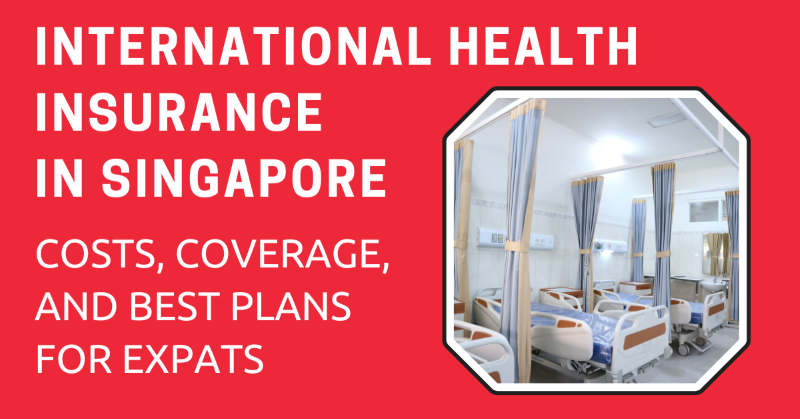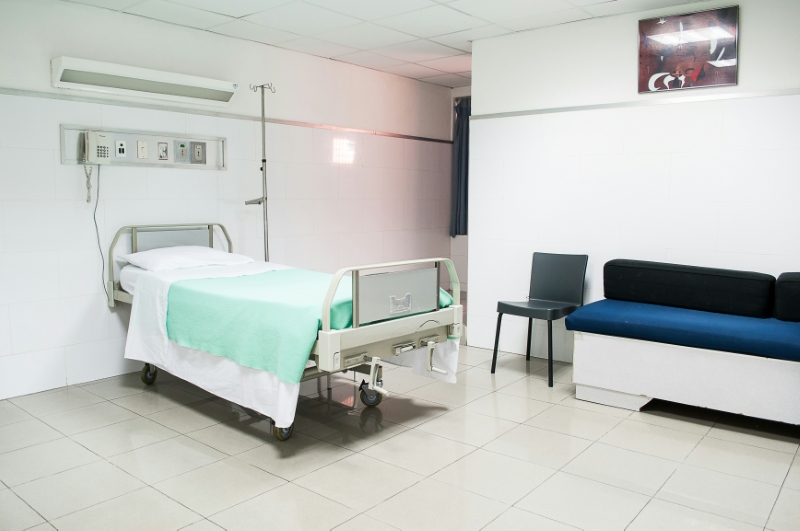
This article will take approximately 19 minutes to read. Don't have the time right now? No worries. Email the ad-free version of the article to yourself and read it later!
Singapore’s healthcare is world-class but costly. This guide explains everything expats need to know about international insurance in Singapore, including coverage, costs, exclusions, and the best providers to consider.
Living in Singapore is expensive. And it’s not just the cost of living, but the cost of healthcare as well.
A simple doctor’s visit can cost several times more than in neighboring countries, and private hospital bills can quickly reach thousands of dollars, even for short stays. That’s why one of the first things you should do after moving here is secure proper health insurance. You want to make sure you’re covered if you ever need medical treatment, whether it’s for an unexpected illness or a medical emergency.
While many people living in Singapore are insured through their employers, company coverage often has limits. It might not include hospitalization, maternity, or treatment outside Singapore. Because of this, many expats start looking into international health insurance as a way to fill those gaps and protect themselves wherever they go.
In this article, I’ll go over everything you need to know about international health insurance in Singapore, including why you need it, how much it costs, what it covers and excludes, and which providers are most recommended by expats.
Disclaimer: This article may include links to products or services offered by ExpatDen's partners, which give us commissions when you click on them. Although this may influence how they appear in the text, we only recommend solutions that we would use in your situation. Read more in our Advertising Disclosure.
Contents
- Key Takeaways
- Why Expats in Singapore May Need International Insurance
- Coverage
- Exclusions
- Claiming
- Cost of International Health Insurance in Singapore
- Best International Insurance Providers for Expats in Singapore
- Local Insurance vs. International Insurance
- Who Should Get International Insurance in Singapore
- Additional Tips for Choosing International Health Insurance Plans
Key Takeaways
- Public healthcare in Singapore only Singapore citizens and permanent residents. Foreigners must rely on employer or private insurance.
- If you work in Singapore, you are insured through your employer. However, many choose basic plans that exclude hospitalization or overseas treatment.
- With local insurance, you may need to pay first and claim later. And it can give you financial burden because of the high cost of healthcare in Singapore.
- Local plans are cheaper but limited to Singapore. International plans cost more but cover multiple countries.
- International insurance generally gives you more coverage, worldwide coverage, higher limits (US$1–2 million), and direct billing. You can keep the same plan when relocating.
- Premium for international insurance vary by age and coverage: Around US$200–400 per month if under 40, and US$700+ for those over 60.
- Popular international insurance providers include Cigna Healthcare, Allianz Care, April International, Henner, VUMI, and Foyer Global Health.
Why Expats in Singapore May Need International Insurance
First things first, let’s take a look at why expats in Singapore need international insurance.
Limited Eligibility for Public Health Schemes
Public healthcare in Singapore such as MediShield Life and Integrated Shield Plans is only available to Singaporean citizens and permanent residents. Most foreign work pass holders are not eligible. And it’s definitely not a good idea to be uninsured in Singapore.
While it can be expensive, having insurance in Singapore is never a waste. If you ever face a serious illness or medical emergency, it can save you from financial ruin and give you access to the best hospitals and doctors without worrying about overwhelming costs.
Find out more: The Overview of Singapore’s Healthcare System for Expats

Local Insurance Can Be Confusing
Local insurance can also be quite confusing. In Singapore, you usually have to buy insurance through brokers instead of directly from the insurer. There’s also uncertainty about how to file claims when you have multiple policies.
For example, even if you have both employer-provided insurance and an Integrated Shield Plan, it can be unclear which plan you should claim from first (see discussion here).
Employer Coverage Is Often Insufficient
If you work in Singapore, your employer needs to provide you with health insurance. According to the Ministry of Manpower, coverage should be at least SGD 60,000 per year. However, the plan provided by your employer can vary. Some companies just get the cheapest plan available to meet the minimum requirement, while others offer comprehensive plans.
So, if you work here, check what you have with your employer first and take a look at the sublimits too. For instance, your policy might only cover surgery costs up to SGD 20,000, but an actual procedure could easily cost SGD 40,000 or more. In that case, you’d need to pay the difference out of pocket. This is why many expats choose to get additional coverage.
International Coverage and Portability
Local insurance in Singapore generally only covers in Singapore. If you need international coverage, you should get international plan. And it’s also possible to keep the same plan even after you move to a new country.
Please note that the area of coverage and portability depend on each policy. I’ll talk more about it later in the article.
Direct Billing
With local insurance, check your policy well. In some cases, you may need to pay first and claim later. This can be a serious financial burden if you’re hospitalized, as hospital bills in Singapore can be extremely high. For example, one single night at the National University Hospital in a private room costs around SGD 800, excluding medications, doctor fees, and other charges.
If it involves surgery, you could easily pay more than SGD 5,000 for a minor operation.
With international insurance, on the other hand, hospitalization is usually covered through direct billing, meaning the insurer settles the bill directly with the hospital.
Coverage
International health insurance in Singapore works much like international plans elsewhere. You should be able to use it at any hospitals in Singapore, including private hospitals.
Below are the key areas of coverage you can generally expect.
Please note that since there are hundreds of plans available, this section gives you only a general overview. For exact details, it’s best to read the fine print of your chosen plan or discuss directly with a broker or insurance representative.
For more information about coverage in detailed, read our guide to health insurance in Singapore.
Annual Limits
Unlike local insurance plans in Singapore that often have sub-limits for each medical procedure, international health insurance usually provides one overall annual limit, especially for hospitalization.
Annual limits typically start at US$1,000,000, which is usually sufficient even in Singapore. However, if you want full peace of mind for extended ICU stays or complex surgeries, aim for at least US$2,000,000 in annual coverage. Some high-end plans even offer unlimited coverage.
Inpatient Treatment
This is the core benefit of most international health insurance plans. All hospitalization-related expenses are usually covered up to your annual limit. This typically includes:
- Room and board
- Hospital and surgery fees
- X-rays, CT scans, MRIs, and other imaging tests
- Medications
- Nursing and operating theater fees
Some insurers may also offer a small daily allowance for an accompanying person during hospitalization, usually around US$20–US$50 per day.
Good to know: Always check the room type included in your coverage. Some lower-cost plans only cover semi-private rooms, and you may need to pay the difference if you prefer a private room.
Outpatient Coverage
Depending on your plan, your insurance may include outpatient coverage. Some providers, such as Cigna Healthcare, set a specific annual limit for outpatient care, while others place limits on how much can be claimed per visit.
Keep in mind that outpatient coverage is often optional, meaning you may need to pay extra to include it. This type of coverage is particularly useful in Singapore, where consultations and diagnostic tests can be expensive. For example, a private specialist visit can cost SGD 200–500, and additional tests may add several hundred dollars more.
Maternity
Many international health insurance plans also offer maternity coverage, which can include prenatal and postnatal care as well as delivery costs in Singapore. However, maternity benefits are usually available only in higher-tier plans and come with a waiting period, typically 10 to 24 months. If you’re planning to have a baby in Singapore, it’s best to secure coverage well in advance.
Emergency Evacuation and Repatriation
In case of a serious medical emergency, some plans cover the cost of evacuation, including air ambulance transport to the nearest suitable hospital or back to your home country.
While this may not be essential for daily life in Singapore, since it’s a small country with excellent hospitals. It becomes important when you travel abroad. Remember, international insurance protects you worldwide, not just in Singapore.
Area of Coverage
One of the biggest advantages of international insurance is its flexibility. Most plans cover you in multiple countries, allowing you to seek treatment outside Singapore if necessary.
Coverage areas typically include:
- Worldwide coverage
- Worldwide excluding the USA (a more affordable option)
- Regional plans that cover Asia, including Singapore
Important: Always check whether your chosen plan specifically covers treatment in Singapore. Some lower-cost regional plans exclude Singapore because of its high healthcare costs.
Emergency Coverage
Most international health insurance plans include emergency coverage. For example, even if your plan excludes the United States, you can still receive emergency medical treatment there if something unexpected happens during your trip.
However, it’s important to note that emergency coverage outside your selected area is limited, both in terms of the duration of coverage and the maximum claim amount.
The limit is usually much lower than what you’d receive in your main coverage area, and treatment must qualify as a genuine emergency (for instance, life-threatening injuries or sudden illnesses).

Other Coverage
Some insurers provide additional benefits beyond standard medical coverage to enhance convenience and overall healthcare experience.
For instance, Cigna Healthcare offers telemedicine, allowing you to consult with a licensed doctor online and receive prescriptions anytime, without visiting a clinic. They also provide case management services, where a dedicated professional helps you coordinate treatment plans, find suitable hospitals, and manage complex medical cases.
While these features aren’t essential, they’re valuable perks that make getting medical advice or assistance much easier, especially when living abroad.
Exclusions
International health insurance doesn’t cover everything. It’s important to understand that every plan has its own set of exclusions: specific situations or treatments that the insurer will not pay for. These vary depending on the provider and policy, so always check the details carefully before buying.
Here are some of the most common exclusions:
- Pre-existing conditions: This is the biggest limitation. If you already have a medical condition before applying, such as diabetes, asthma, or heart disease, that condition usually won’t be covered. Some insurers may agree to include it for an additional premium, but this is quite rare. In certain cases, such as high blood pressure or joint pain, some providers may still offer limited support to help you manage the condition.
- Self-inflicted injuries: Any injuries caused intentionally will not be covered.
- Drunk driving or drug use: Accidents or injuries that occur while under the influence of alcohol or drugs are excluded.
- Cosmetic or elective surgery: Procedures done for appearance rather than medical reasons aren’t covered.
- Alternative treatments: Most plans exclude treatments like acupuncture or traditional therapy unless specifically stated in the policy. Some higher-end plans may partially cover certain therapies such as physiotherapy or chiropractic sessions.
Always read the fine print or talk directly with an insurance representative to fully understand what’s excluded from your policy.
Claiming
The claim process varies slightly between insurance providers, but it generally works like this:
- Outpatient treatment: You’ll usually pay the bill upfront and then submit the necessary documents, such as medical receipts, diagnosis reports, and claim forms, to your insurance company for reimbursement. Most insurers process claims within a few working days once all documents are received.
- Hospitalization: In many cases, the insurance company will pay the hospital directly. This system, known as direct billing, is available at most major hospitals in Singapore. However, it’s always best to contact your insurer in advance and get pre-authorization before admission. This step confirms what’s covered and prevents any misunderstanding about your benefits or limits.
Cost of International Health Insurance in Singapore
International insurance doesn’t come cheap. It can, in fact, be much more expensive than local insurance.
To give you an idea, if you’re under 40 years old, expect to pay around US$200–US$400 per month for a solid international health insurance plan without deductible.
For those over 60, premiums can easily exceed US$700 per month.
Please keep in mind that these are only rough estimates. Premiums vary widely depending on many factors, including:
- Your age and health condition
- The insurer and specific plan
- Level of coverage (inpatient only or including outpatient and maternity)
- Area of coverage (worldwide or excluding the U.S.)
- Deductible and cost-sharing options
- Your nationality and country of residence
The best way to find your actual cost is to request a personalized quote directly from an international insurance company or speak with a licensed broker who works with multiple providers.
Tip: If you want to lower your premium, choose a basic plan with hospitalization coverage and a higher deductible. Many expats in Singapore use this strategy to protect themselves against major emergencies while relying on their employer’s local insurance for smaller outpatient costs. This way, you stay covered for serious situations without overpaying for overlapping benefits.
Best International Insurance Providers for Expats in Singapore
In this section, let’s look at some international insurance providers worth checking out if you’re an expat living in Singapore.
Before naming specific companies, it’s important to be clear: there’s no single “best” provider for everyone. The right plan depends entirely on your needs, lifestyle, and budget. For example, a company offering extensive global coverage and premium support will naturally cost more than one with a simpler, more affordable plan that provides basic protection.
That said, here are some of the most popular international insurance providers among expats in Singapore:
- Cigna Healthcare: One of the most recognized international insurance companies worldwide. Cigna offers strong global coverage, reliable customer support, and a wide range of plan options. They’re slightly more expensive, but their plans are known for comprehensive benefits and dependable claims handling. You can read our full review to learn more.
- April International, Henner, and VUMI: These providers are popular among expats in Asia. Their plans are often more affordable than Cigna’s, making them attractive for those on a tighter budget. However, they may come with lower annual limits or fewer optional add-ons.
- Allianz Care: Known for its corporate and global coverage. It’s a trusted option for professionals who want consistent worldwide protection, especially if you frequently relocate or travel for work.
- Foyer Global Health: Offers plans with unlimited annual coverage and flexible benefits. It’s ideal for those who want maximum protection, though premiums can become quite high as you get older.
If you’re unsure which plan fits you best, consider talking with an international insurance broker. Explain your situation, budget and medical needs, and they can help you compare plans and find one that matches your requirements. You can use this form to get in touch with our partnered broker.
Local Insurance vs. International Insurance
If you’re still deciding between getting local or international health insurance in Singapore, here are some points to help you make an informed choice.
Local insurance is generally more affordable, but it comes with limitations. Coverage is usually restricted to Singapore, and the range of hospitals or specialists you can visit may be narrower. And certain high-cost treatments may not be fully covered.
International insurance, on the other hand, costs more but offers broader protection, including coverage outside Singapore, higher annual limits, and access to a global network of hospitals.
To put it simply:
- If you have a limited budget and only need protection while living in Singapore, a local plan is sufficient.
- If you have more flexibility in budget, want international coverage, and prefer high-quality care with fewer limits, go with international insurance.
A practical approach many expats use in Singapore is to combine both: rely on your employer-provided local insurance for routine outpatient visits and daily healthcare needs, while maintaining an international plan with a high deductible to cover major hospitalizations or medical emergencies.
Some expats also choose to return to their home country for major treatments if they have access to public healthcare there. However, this isn’t always possible or convenient, especially during emergencies, so it’s best not to rely on that option alone.
Who Should Get International Insurance in Singapore
International insurance isn’t for everyone. In fact, some people might be better off with local or employer-provided plans instead. Here are a few cases where international insurance may not be the right choice:
- Those with a limited budget: As mentioned earlier, international insurance is usually much more expensive than local plans. If cost is your main concern, it’s often better to rely on a local plan that still provides adequate protection within Singapore.
- Those who already have good insurance: If you already have comprehensive health insurance through your employer or another provider, check what it covers. Many expats find that their existing plan already includes good hospitalization and outpatient benefits, making additional international coverage unnecessary.
- Those who only need coverage in Singapore: If you rarely travel outside the country, a local plan may be more cost-effective. It will cover you for most situations you’re likely to face while living here.
- Those planning to get Permanent Residency (PR) or citizenship: If you intend to stay in Singapore long term and apply for PR or citizenship, international insurance might not be necessary. As a PR or citizen, you’ll have access to the MediShield Life and Integrated Shield Plan systems, which are much more affordable than private international plans. You can then supplement these with private local insurance if needed.
In short, international insurance is most useful for expats who move between countries or want comprehensive coverage that follows them wherever they go. But if you’re planning to settle permanently in Singapore and become part of its healthcare system, a local plan may serve you better in the long run.
Additional Tips for Choosing International Health Insurance Plans
If you’ve made it this far and are considering getting international insurance, here are a few tips to help you pick the right plan:
- Focus on inpatient coverage if you already have local insurance through your employer or another source. You can rely on your international plan only for major hospitalizations or emergencies.
- Choose a high deductible and co-pay option. This can greatly reduce your premium. Many expats use this approach, keeping their international plan mainly for big medical expenses.
- Select only what you truly need. For example, if you don’t plan to have children or rarely travel to remote areas, you can skip maternity or emergency evacuation coverage if your plan allows customization.
- Read the fine print carefully. It may seem tedious, but it’s essential. The fine print explains exactly what’s covered, what’s excluded, and how claims are handled.
If you’re still unsure where to start, consider getting a free quote from Cigna Healthcare. It’s not the cheapest option, but its international coverage and service quality make it a strong choice for many expats in Singapore.
And if you want more personalized guidance, it’s best to speak with an international insurance broker. Tell them your needs and budget, and they can help you compare multiple plans and recommend what fits you best.
Disclaimer:
I’m not a financial advisor or insurance broker, but I’ve reviewed over 100 international health insurance plans and consulted with several experts while researching for this article. Although every effort has been made to ensure accuracy, mistakes can still happen and insurance policies are complex. Always read the fine print and confirm details directly with the provider before making a final decision.







